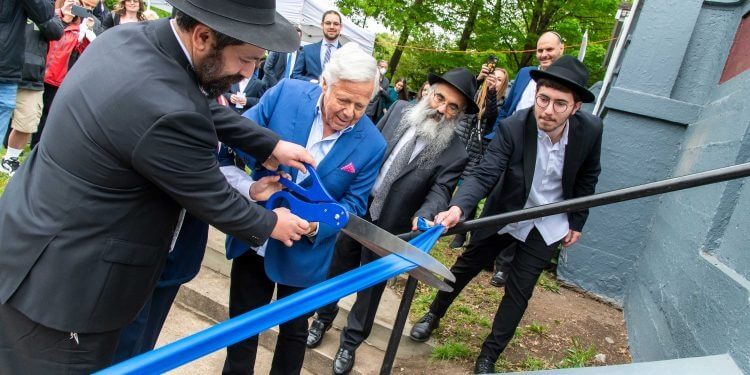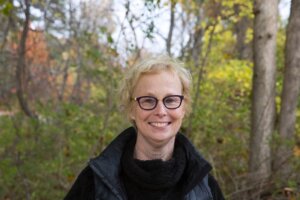After being stabbed, this Boston Chabad rabbi is launching a rabbinical school
Rabbi Shlomo Noginsky has raised $1 million and will train eight rabbis a year – ‘one for each stab.’

Graphic by Angelie Zaslavsky
This article originally appeared on the Jewish Journal of Boston. It was reprinted here with permission.
BRIGHTON – Last Thursday, Rabbi Shlomo Noginsky – the man of the hour – seemed distracted.
Certainly there was plenty to distract him as he fetched a basket of yarmulkes for that afternoon’s ceremony marking the start of his brand-new rabbinical school, and gathered his children together for the event (no easy task – he has 12 of them and some were on a trampoline in the yard, tzitzits flying.) He greeted local politicians, community activists, and a few bold-faced names such as New England Patriots owner Robert Kraft.
All this as light classics were being played in the background on an electrified violin, and Israeli-style finger food was laid out on a table under a canopy.
As an added – and very important – distraction, that night was his son Shneur’s bar mitzvah.
And it was the holiday of Lag B’Omer.
And his wife Nira’s birthday.
And – most importantly – he was still alive.
Not even a year has passed since Noginsky lay in excruciating pain at Boston Medical Center, suffering from eight stab wounds delivered by an assailant who – as the rabbi would later say – “had hatred in his eyes” for Jews as individuals, and Jews as a people.
But even as he lay there, he made a pledge to pursue a longtime dream. He would open a new rabbinical training school and now he would ordain eight new rabbis each year. One for each stab wound he received.
“We cannot allow attacks on our faith to cow us into hiding our Judaism,” Noginsky said.
May 19 was the day he announced the fulfillment of his dream. Everywhere there were signs of tight security, a necessity that was a reminder of what prompted this occasion. As he stood before the new school, he proudly proclaimed “a “new chapter in Boston Jewish history.”
Only three years ago, Noginsky was known to few in Boston outside of the Chabad community. Born in the Soviet Union – which he fled with his family to escape antisemitic persecution – he lived in Israel until 2019, when he was recruited as rabbi and educator for the Russian-speaking community at the Chabad-Lubavitch Shaloh House Jewish Day School in Brighton.
But on July 1, 2021, he gained international renown as the heroic rabbi who outwitted an assailant trying to kill him outside of Shaloh House, where some 100 Jewish children were inside attending summer camp.
The attacker had a gun and a knife, and stabbed him brutally. Noginsky – who had only his bare hands but was trained in martial arts – managed to outwit him, luring him away from the children into a deserted park. Khaled Awad, a native of Egypt who had been living in Brighton, was arrested nearby after he allegedly pulled the gun on police officers.
“You all know that last year was not very easy for me,” Noginsky said solemnly as he stood at the podium outside the site of the new rabbinical school, flanked by his wife, seven sons, and five daughters ranging in age from 22 months to 21 years. The girls and their mother wore matching emerald green dresses that Nira had ordered from Israel.
Noginsky, who speaks little English, wiped away tears as he watched a dramatic video created for the event that reprised the attack and his determination to move forward.
“Over the past 10 months, my wounds have healed and my pain has been slowly dwindling,” he said in the video, speaking through a translator. “But we have not been passive. When G-d saved me, I made a promise to expand my teaching activities. And I fully intend to keep it. We are now in the final stages of planning and developing a comprehensive state-of-the-art rabbinical program which we hope to launch starting this coming year. And with this amazing new building, our dream is starting to become a reality.”
The building, on Commonwealth Avenue near Cleveland Circle, is actually a 102-year-old, 11-bedroom two-family home that will be converted to serve as a rabbinical institute with a kitchen, dining room, and dormitory, as well as a residence for the Noginsky family. The program will operate under the auspices of the Chabad-Lubavitch’s Shaloh House network in Boston led by Rabbi Dan Rodkin, He described its curriculum as unique, offering both a traditional rabbinical certification course and a practical internship where students will get a hands-on education leading services, giving Torah classes, and officiating at Jewish life cycle events.
Robert Kraft personally contributed $250,000 toward the $1 million that was raised for the $2.5 million campus. The remainder came from three anonymous donors and from the international Jewish community.
There seems to be no shortage of applicants for the program. Six potential students attended the event, hailing from Boston, Pittsburgh, Toronto, and even Hungary. One of them was Levy Shusterman of Pittsburgh, who said Noginsky’s story was eerily familiar to him. He was in Pittsburgh around the time of the deadly 2018 Tree of Life Synagogue shooting, and the Brighton stabbing brought it all back to him.
“I remember very clearly turning on my phone after Shabbat and hearing about the Pittsburgh attack,” he said. This is partly why he was drawn to apply to the Brighton program.
In his speech, Noginsky said he believed it was not just coincidence that they were inaugurating the rabbinical program on the day of Lag B’Omer. It was “divine providence,” he said, recalling the story of Rabbi Akiva, the master teacher who lost 24,000 students to a mysterious plague that ended on the day now observed as Lag B’Omer.
“Some might think that after such a great tragedy, Rabbi Akiva would retire from teaching and try to somehow forget about what happened,” Noginsky told those gathered. “But instead, he decided to establish a new yeshiva.”
There were more speeches, including one by Kraft, who was among the first to visit Noginsky after he was stabbed, calling him a “hero.” Kraft invited “the bar mitzvah bokher [young man]” to help him cut the ribbon to inaugurate the new building, presenting him with (what else?) a Patriots jersey with “Shneur” printed on the back.
But the day was just getting started. Less than a mile away, dozens of children soon began to congregate at the park across from Shaloh House to celebrate Lag B’Omer. There was face painting, a petting zoo, pony rides, a magic show, and an inflatable obstacle course.
And tight security.
Kids with painted faces were among the 150 or so guests who then streamed into Shaloh House for Shneur’s bar mitzvah. The violinist from the ribbon-cutting ceremony was there too, though this time his set list had a more Jewish theme.
The customary blessing that was traditionally bestowed upon bar mitzvah boys by the late Lubavitcher Rebbe Menachem Mendel Schneerson was read by a local rabbi, and guests were requested to stand as a sign of respect. Shneur recited – from memory – a maamar or “Hassidic discourse,” Rabbi Rodkin said, describing his obligations to do mitzvot and wrap tefillen.
Platters of food were served. More platters were served. Lavish decorative desserts lined tables against two walls, including a birthday cake for Nira, still wearing her green dress, as were her daughters. Dancing commenced. A jubilant Shneur was hoisted on a chair.
Rabbi Noginsky seemed ecstatic, if weary. In an interview the next day, translated by Rodkin, he expressed deep gratitude and said he was “overwhelmed with joy” from all the community support.
“Yesterday was a celebration of the results of the support,” he said. “A celebration of a new beginning.”
This article originally appeared on the Jewish Journal of Boston. It was reprinted here with permission.

















